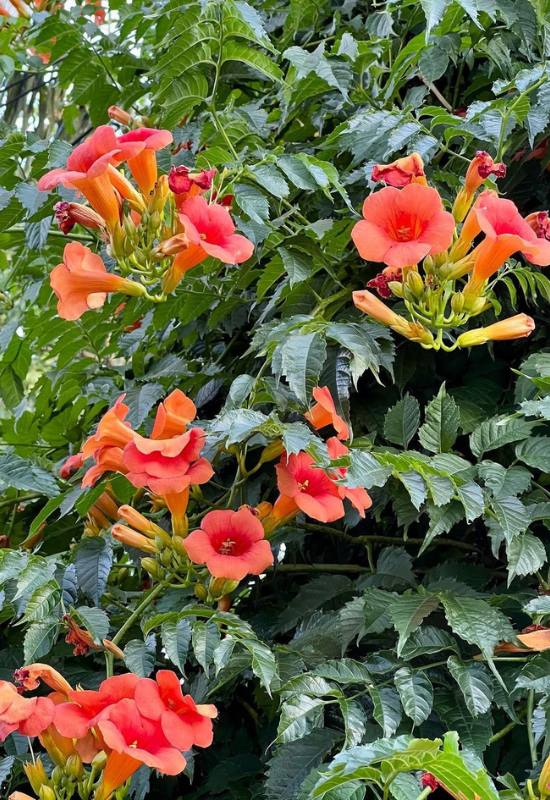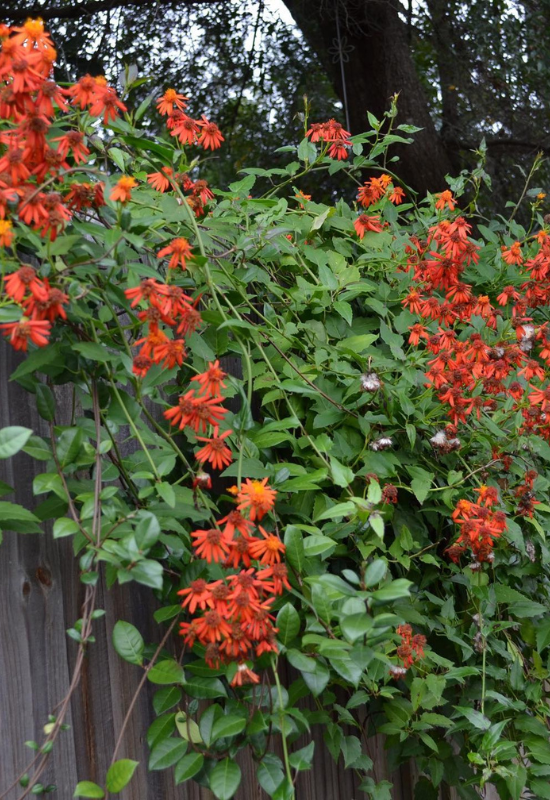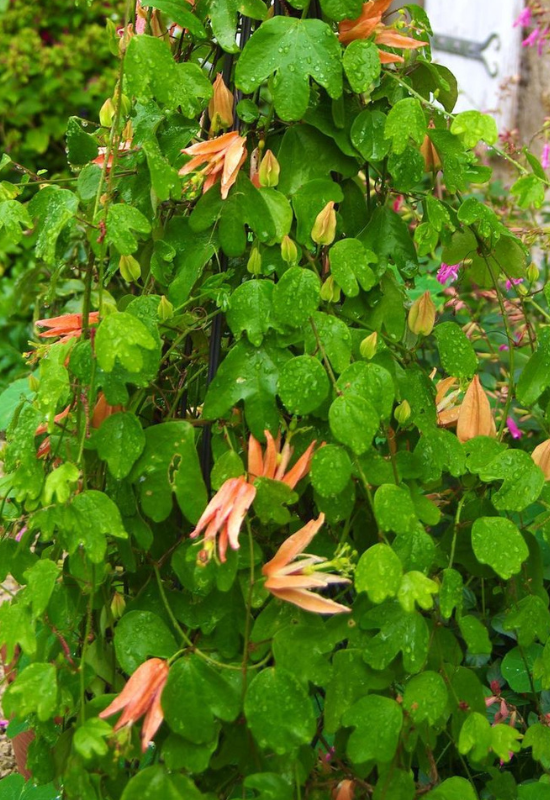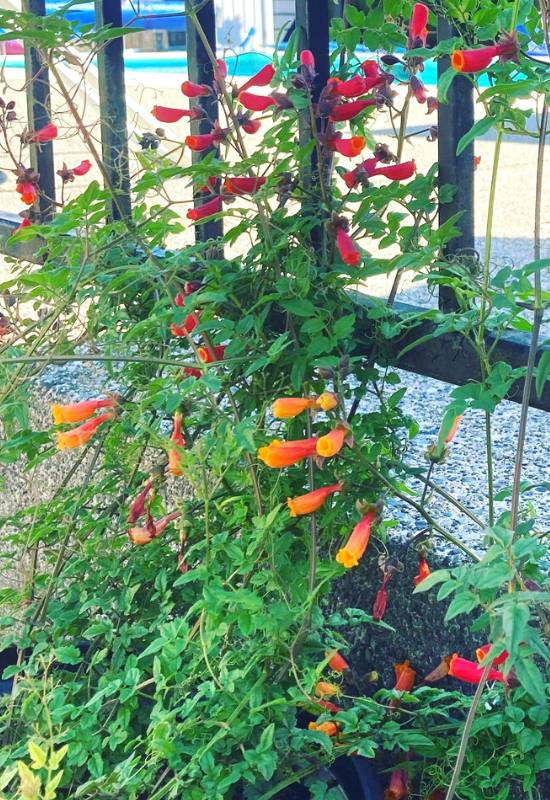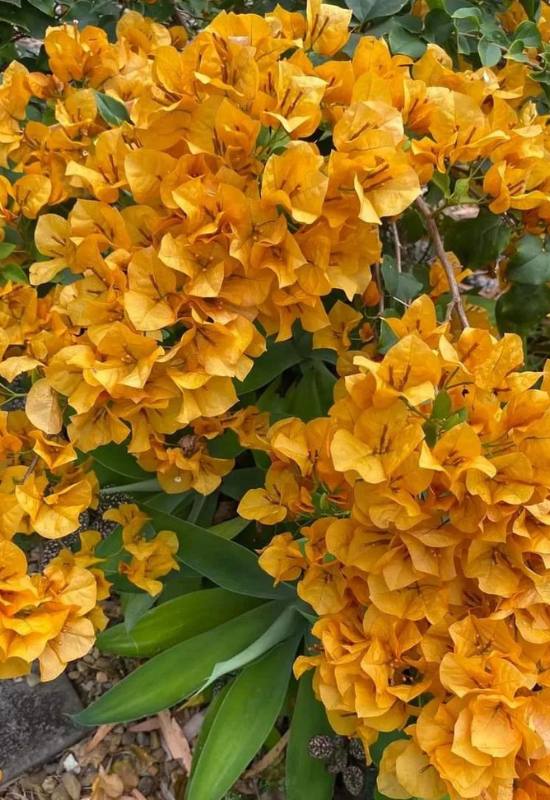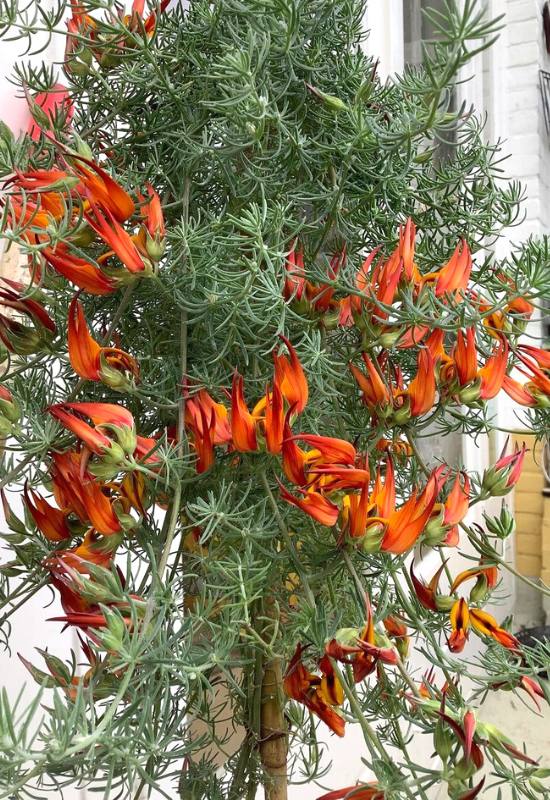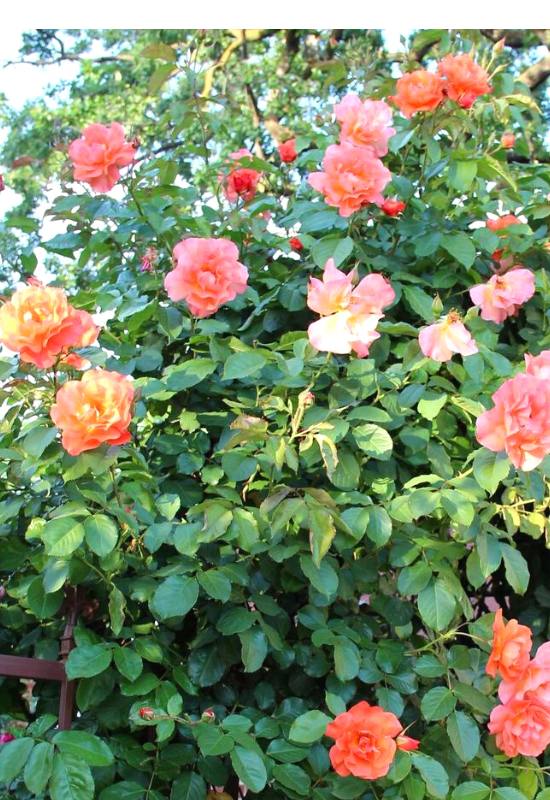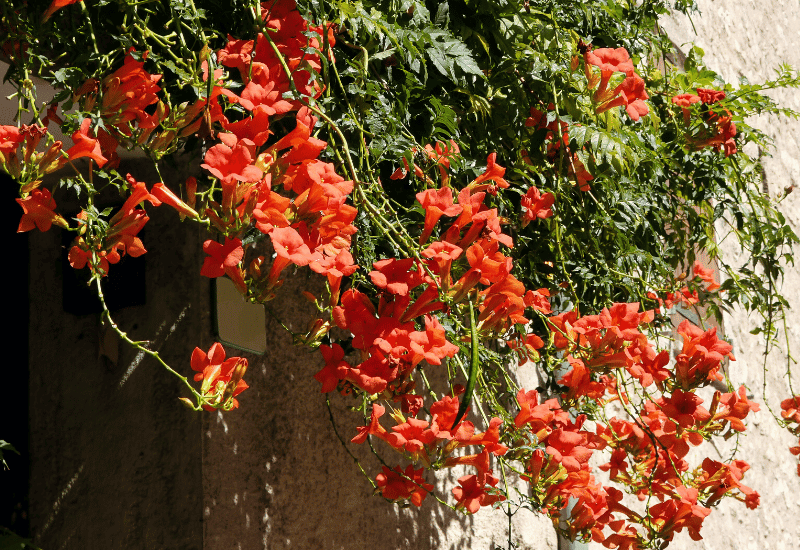
If dawn is pink, orange is the glowing color of sunset. And flowers on vines with shades of ginger, honey or tangerine fill you with that same feeling, that same energy, that same warmth.
They also move your eyes up, to meet them draping your pergolas, shading your porch, blooming brightly on your fence or dressing your old wall with fresh foliage and vivid blossoms.
Climbing up on trellises and other structures, these twining or gripping green beauties will bring that vertical movement all gardens need.
Meeting the blue of the sky, mixing with the green of the leaves, and shining with orange floral displays, like sparks of light on a tapestry of verdant prairies and cobalt sea…
We associate orange floral displays with summer and fall, but we found orange flowering vines that bloom in spring, in summer and – incredibly – even quite a few for your winter garden!
If you want the magic of the setting sun to blossom on vines all year round, and all day long, your choice is one of the flowering climbers with orange blooms that are waiting for you!
12 Warm and Energetic Orange Flowering Vines That Will Add a Zest to Your Garden
Few vines really have strong and energetic orange blooms, and the ultimate list is as follows:
We can start off right now, without delays, with a lovely honeysuckle variety.
1: ‘Mandarin’ Honeysuckle (Loniceramacgregorii ‘Mandarin’)
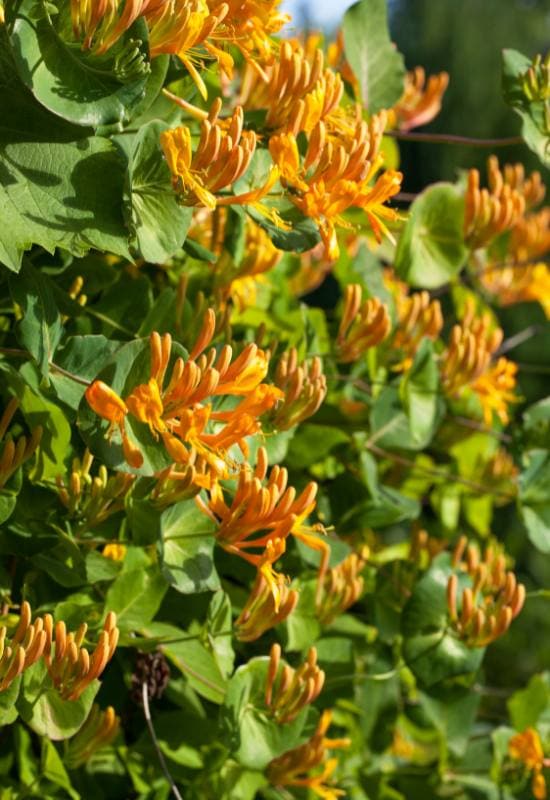
Honeysuckle is a very famous vine with many varieties with orangish flowers, meaning that they range from yellow to red, often within the same head.
But ‘Mandarin’ a cultivar of this exotic looking plant, is different: it is clearly and fully orange!
Brighter at the mouth of the elongated, trumpet shaped blooms, and darker, redfish but not just at the back base, on the outside.
With repeated and generous blossoms that start in early summer and end late in fall, it’s one of your best friends to have this color on a climber in your garden.
The clusters are perfectly set off and yet compensated by the green and pinnate leaves, which add elegance to the already sophisticated floral display.
And this is a winner of the famous Award of Garden Merit by the Royal Horticultural Society.
Low maintenance, ‘Mandarin’ honeysuckle is a world favorite orange flowering vine for pergolas, fences and harbors all over the world.
Perfect for informal designs thanks to its lace like draping and long lasting floral show! And, despite its exotic look, it is cold hardy as well!
2: ‘Orange Noah’ Morning Glory (Ipomoea coccinea ‘Orange Noah’)
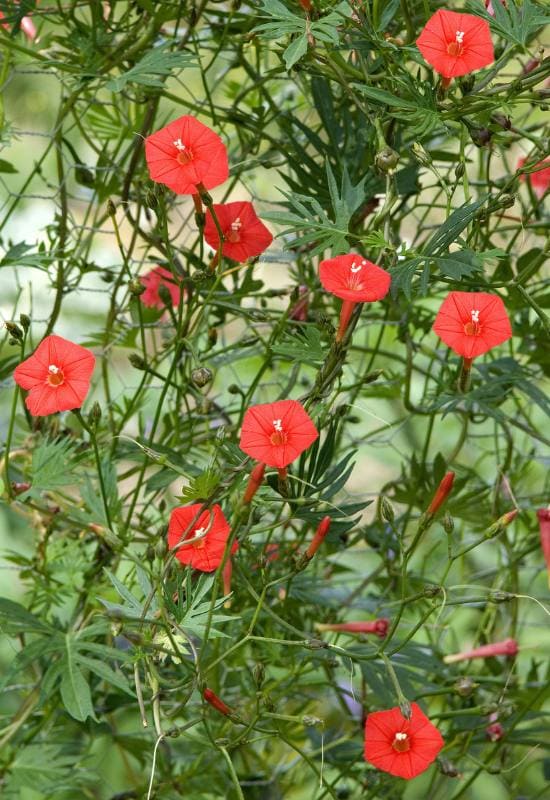
A climber with lovely and energetic look is ‘Orange Noah’ morning glory. It has the typical funnel shaped flowers with a board, open and broad mouth, roughly pentagonal, but unlike other varieties that have a palette of whites, pinks and violets, it has orange on its smile!
The mother species (Ipomoea coccinea) has a large and almost red ring around the edges, and a candlelight hue in the center, but our cultivar is fully tangerine!
Each head is about 1 inch across (2.5 cm), but you will get many of them, from summer all the way into fall.
The deep green leaves can be lobed or toothed, or both. The vine is very thin indeed, so, it will look like the blossoms and foliage literally hang in the air.
Usually grown as an annual, ‘Orange Noah’ morning glory will look sweet in all informal settings, and you can even use it as ground cover, because if it does not find support, it will simply crawl on the ground with its orange blooms.
3: ‘Bright Future’ Climbing Rose (Rosa ‘Bright Future’)
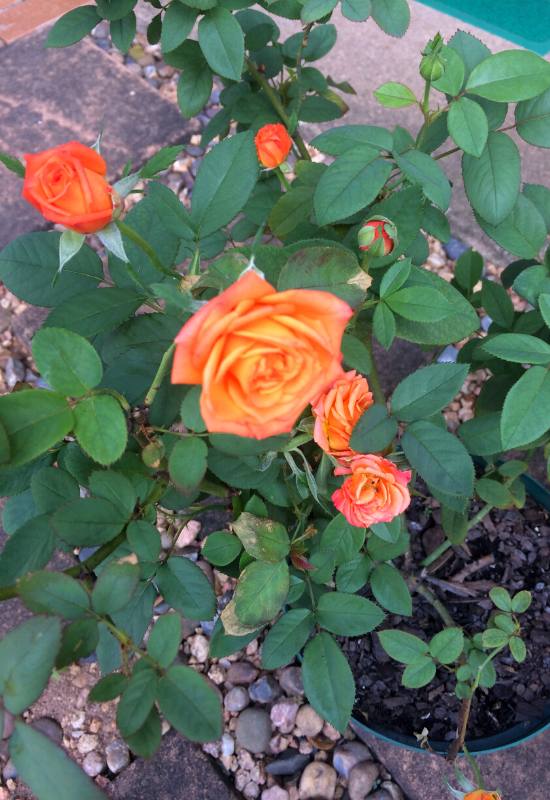
We could not leave out a climbing rose from our list, even if not technically a vine, but ‘Bright Future’ really deserves your attention.
Its orange double flowers have a peach blush to them, for an effect which is both energetic and romantic.
Each bloom comes individually on the stem, with about gently dented 25 petals and it has a very elegant shape, almost like a hybrid tea.
Very fragrant, they will grace your garden during the hit days of summer. The foliage is quote glossy and healthy, emerald green, and a great contrast with the red hips that will follow the floral display and ripen at the end of the season.
A recent cultivar, ‘Bright Future’ is perfect for pergolas, even a gate, in any case a very prominent place in your green space. Perfect for an English country or cottage garden, it will also suit many other informal styles.
4: Trumpet Vine (Campsis radicans)
Trumpet vine is a garden classic, and a protagonist of summer days with its – you guessed – long and showy trumpet shaped blooms which display a few shades of orange.
From fire, even red at the mouth to tiger and the tangerine as you move towards the base, the flowers come in clusters at the end of very thin vines in great profusion. And they are a favorite of hummingbirds!
They are followed by seed pods that stay on the branches till late in the season. The foliage too is very elegant!
Lush but finely textured, thanks to the bright green pinnate leaves that give it a fresh but also refined look.
Prefect to cover walls, trumpet vine will work very well in most vine functions, like harbors and pergolas. While it has an exotic look, it is fairly cold hardy and it suits even traditional, temperate looking gardens.
5: Mexican Flame Vine (Senecio confusus or Pseudogynoxyschenopodioides)
For long lasting blooms of a deep fire orange color, Mexican flame vine is the first that springs to mind.
The blooms have many long and thin petals, clearly spaced and many pistils of a lighter shade that form a fluffy crown in the center.
They look a bit like spiders, daisies or stars with many bright rays! Blooming in spring, summer and fall, you will never be short of them in your garden throughout the whole season.
The actual hue gets darker as the months progress… They are then followed by puffy seeds, like dandelions. The foliage is broad, arrow shaped and fleshy, of a lovely emerald green color.
And you will have this lush and refreshing foliage display in winter as well, because it is a evergreen variety.
Let Mexican flame vine cascade over your walls to coat them with its leaves and brighten them up with its orange flowers, or grow it on arbors and trellises. But if you wish, you can even grow it in hanging baskets!
6: Orange Petalled Passion Flower (Passiflora aurantia)
Passion flowers are usually purple, red, violet etc., but there is one species of this exotic looking vine with orange blossoms, Passiflora aurantia, commonly known as blunt leafed passionfruit or orange petalled passion flower.
The fleshy petals look like swords, and there are 5 longer ones alternating with 5 shorter ones.
When closed, the blossoms have a spider like look, while when they are fully open they resemble decorative stars.
The reproductive organs form a long, greenish staminal column with pistils arranged like rays, and saffron anthers. Less showy than in other varieties, but still unique.
Its floral spectacle will last from summer all the way to the end of fall. The leaves have three, very balanced and harmonic lobes, though sometimes they are irregular, and they are mid to deep green. The beautiful fruits ripen to deep wine purple, but they are not edible…
A very exotic and fairly uncommon variety of Passiflora, orange passionflower is a real beauty to enchant visitors when it climbs up trellises, or decorates gates and porches, or for any use you would have for vines, even in an exotic style garden!
7: Flame Vine (Pyrostegiavenusta)
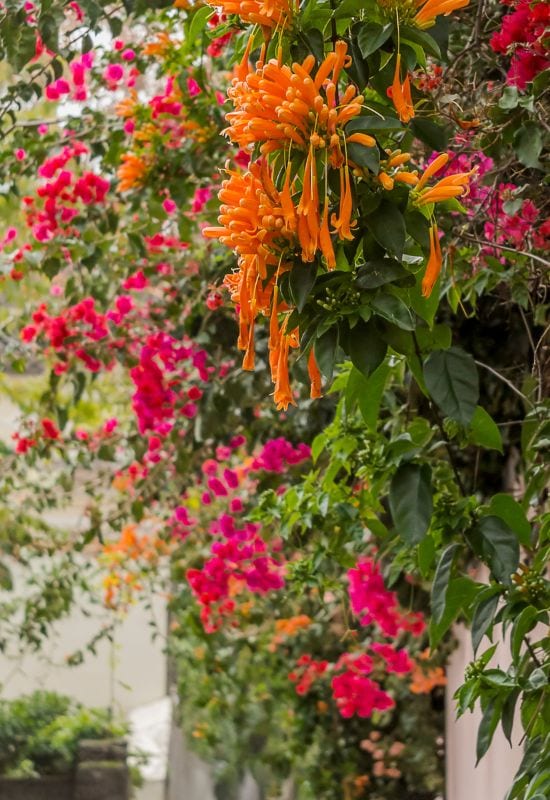
Let me surprise you with an impressive vine that will blossom in full winter! The bright, fully orange buds look like over colored bananas, in thick clumps, and they point upwards, and they are in themselves very attractive…
When they open, they finally display their lightly bent funnel shape, with small mouths crowned by star forming petals that still look up to the sky.
Dangling from the hanging thin vines they form a full wall of flowers cascading like an orange fountain! And close by, you will notice lovely shades of tiger and tangerine!
The dense, evergreen foliage is heart shaped and smooth, mid to dark green. This exotic beauty from Brazil, Bolivia, Argentina and Paraguay is a real climbing queen!
Flame vine is by far the best choice for trellises, arbors, pergolas fences and any place you need a climber and you want to bring it to life in winter with its incredible floral displays, while it will keep it green all year round! The only drawback is that it needs a very warm climate.
8: ‘Burst of Orange’ Chilean Glory Flower (Mitracarpus scaber ‘Burst of Orange’)
Chilean glory flower comes in flaming reds, deep pink, even purple, but the ‘Burst of Orange’ cultivar is actually fully orange, tiger to honey!
The waxy, tubular and slightly bent blooms come in lovely open clusters, well spaced, and they thin at the mouth, almost closing like an urn!
The stems arch upward from the vines, as if bringing their other worldly floral display into the sky! And you will enjoy this spectacle all the way from late spring into fall!
Each flower head is small, about 1 inch long (2.5 cm), buts still showy and the overall effect is enchanting!
The dense foliage has three lobes, an herbaceous look and it is mid green in color. If you prefer, there’s also ‘Orange Red’, a bicolor variety and even ‘Tresco Gold’, where the blossoms start off bright purple at the base, move to red and then finally orange!
Chilean glory flower is a winner of the Award of Garden Merit by the Royal Horticultural Society – no surprise.
Perfect to soften any type of structure, from pergolas to gates, ‘Burst of Orange’ Chilean glory flower has both good foliage texture and long lasting orange blooms that suit most informal garden designs.
9: Black Eyed Susan Vine (Thunbergia alata)
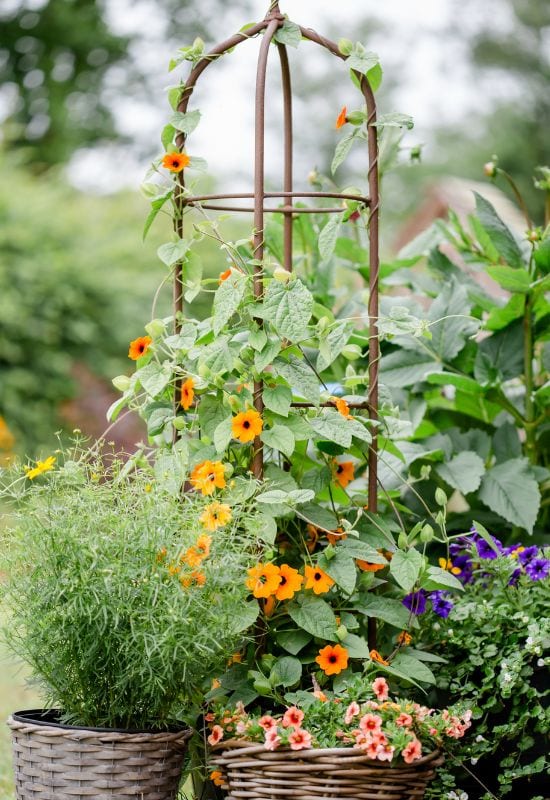
Here’s yet another garden classic to climb up with its energetic and sweet looking flowers: black eyes Susan vine!
With five, rounded and dented petals, so that each has tow lobes, the blooms display a very bright and vivid orange color with a dark almost black center.
Very showy indeed, they are about 2 inches across (5.0 cm) and flat, but the central spot give them a three dimensional depth.
Scattered all over the green backdrop of the dens, mid green foliage, they will brighten up your garden in both summer and fall. The leaves are mid green arrowhead shaped, and very dense indeed.
Being a fast climber, black eyed Susan vine is usual grown as an annual. Ideal for fences and walls, but also hanging baskets, it really has its place in traditional and natural looking gardens, but I wouldn’t underrate it in an exotic setting as well.
10: ‘Carolina Gold’ Bougainvillea (Bougainvillea x buttiana ‘California Gold’)
If you live in a warm place and you want a sea of orange all year round (yes – all year round!) your only choice is ‘Carolina Gold’ bougainvillea!
The papery, see-through bracts that surround the actual flowers with their regular, pyramidal shape like origami are of a bright tangerine color, and they literally cover the whole vine at times.
At other times, this exotic perennial will take a little rest, or give you lesser displays, but the show throughout the year is a real spectacle. It also produces small fruits, but they are usually missed because if the mind blowing blossoms…
The small, fairly glossy mid or dark green and evergreen leaves will also stay on the branches throughout the year, protected by long and pointed thorns.
Bougainvillea is a classic in Mediterranean gardens, though ‘California Gold’ is a lesser known variety.
Still for any wall, as ground cover for banks, and in coastal gardens, its spectacular orange blooms are priceless!
11: Lotus Vine or Golden Parrot’s Beak (Lotus maculatus)
Super exotic, lotus vine or golden parrot’s beak is – well, hard to describe! The flowers look like flames, literally, or in fact the crooked beaks of the tropical birds.
They have bright red tips, and then they fade into fire orange, then pale orange, and you can see some yellow to, just to add some light!
They come profusely throughout the whole of spring and into the beginning of summer as well. It then depends on the heat; if it is too much, it will stop blossoming, otherwise it will continue till the end of August.
They contrast beautifully against the fine, pale blue green foliage, which is dense and made up of manyneedle like leaves that come in little tufts.
One thing though, this is a very small climber, not even reaching a foot tall, but with a spreading habit.
Golden parrot’s beak or lotus vine is suited for small garden jobs, like hanging baskets, on container on top of walls and fences, or rock gardens. But it is really worth having!
12: ‘Bridge of Sighs’ Climbing Rose (Rosa ‘Bridge of Sighs’)
We conclude our journey with a classic! ‘Bridge of Sighs’ climbing rose even has its own Wikipedia page! With its apricot petals, it has both the orange energy and a soft, suave undertone.
It is a semi double variety with a cupped shape and between 9 and 16 petals, and you can still see the center, where pollinators collect.
Each flower is 2 to 3 inches wide (5.0 to 7.5 cm)m so fairly large and showy, and you will get between 3 and 7 in each cluster. And they have a strong and fruity fragrance too!
It is a repeat bloomer as well, starting in spring, and then blushing up again with its floral displays in summer, and then again in fall!
It also has very flexible canes, which means that you can train it into any shape you want! Apart from the usual red hips, it will also offer you glossy dark leaves that can even shade into purple!
Bred by Jack Harkness in 2000, and arguably his most famous cultivar, ‘Bridge of Sighs’ climbing rose is a spectacular climber to have in a very focal position, on walls, trellises, or if you have a porch, that’s really where you want to enjoy it.
Warm Sunset Vibes All Year Round with Orange Blooming Vines
I guess that just looking at the pictures of the flowers you had that warm but energetic feeling that only sunset can give… Well, not only, because our vines can give you the same fleeing, in spring, summer, fall and even winter!

Written By
Amber Noyes
Amber Noyes was born and raised in a suburban California town, San Mateo. She holds a master’s degree in horticulture from the University of California as well as a BS in Biology from the University of San Francisco. With experience working on an organic farm, water conservation research, farmers’ markets, and plant nursery, she understands what makes plants thrive and how we can better understand the connection between microclimate and plant health. When she’s not on the land, Amber loves informing people of new ideas/things related to gardening, especially organic gardening, houseplants, and growing plants in a small space.

